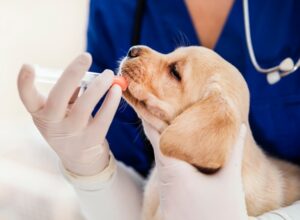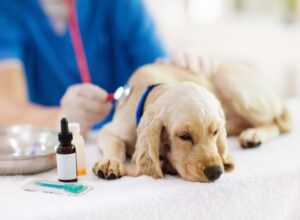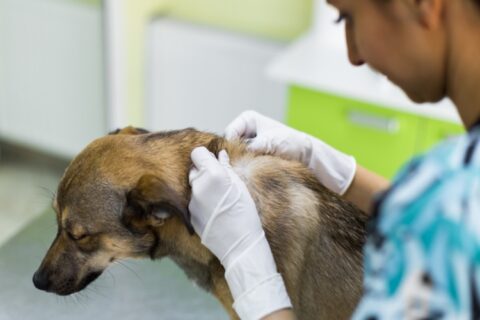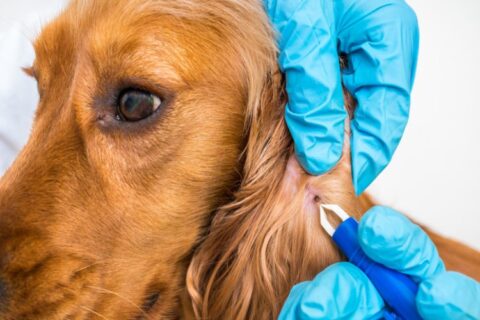Gastric Dilation-Volvulus (Bloat) in Dogs
Urgent Bloat GDV Treatment in Campbell & Saratoga, CA
At Reed Animal Hospital in Campbell and Saratoga, CA, we understand the urgency and seriousness of bloat (GDV) in dogs. Recognizing the signs of bloat in dogs and seeking immediate treatment can be critical in saving your pet’s life. Bloat, also known as gastric dilatation-volvulus (GDV), is a life-threatening condition that requires prompt medical attention. As experienced veterinarians, we are well-equipped to diagnose and treat bloat GDV in dogs with urgency and precision. Schedule a consultation with our team today to learn more about our bloat GDV treatment options.
What Is Gastric Dilation-Volvulus (Bloat)?
Gastric dilation-volvulus (GDV), commonly known as bloat, is a serious and life-threatening condition that affects dogs, particularly large and deep-chested breeds. Bloat occurs when a dog’s stomach fills with gas, fluid, or food, causing it to expand and twist on its axis. This twisting, known as volvulus, obstructs the flow of blood to the stomach and other vital organs, leading to tissue damage and potentially fatal complications.

Different Types of Bloat
Bloat, a serious condition in dogs, comes in various forms, each requiring prompt veterinary attention. Understanding the different types of bloat can help pet owners recognize symptoms and seek appropriate treatment:
- Gastric Dilation-Volvulus (GDV) – Also known as “twisted stomach,” GDV takes place when the stomach fills with gas and rotates, causing obstruction and potential tissue damage, leading to life-threatening complications.
- Non-GDV Bloat – Non-GDV bloat encompasses various conditions where the stomach expands without rotation, such as gastric dilatation without volvulus or gastric distention without torsion.
Causes of Gastric Dilation-Volvulus
Gastric dilation-volvulus (GDV) in dogs is a serious and potentially life-threatening condition that requires immediate veterinary attention. Several factors can contribute to the development of GDV:
- Gastric Dilatation – The stomach becomes distended with gas, often due to rapid eating, excessive swallowing of air, or drinking large volumes of water, leading to increased pressure within the abdomen and subsequent stomach enlargement.
- Stomach Torsion – The distended stomach can twist on its axis, causing a blockage of blood flow to and from the stomach, leading to tissue damage and organ dysfunction. This torsion can occur spontaneously or be triggered by vigorous activity after eating, making deep-chested breeds more susceptible.
- Genetic Predisposition – Certain dog breeds, such as Great Danes, Standard Poodles, and Weimaraners, are genetically predisposed to GDV due to their anatomy, including deep chests and narrow waists, which can increase the risk of stomach dilation and torsion.

GDV Bloat Symptoms
Understanding the symptoms of gastric dilatation-volvulus (GDV) in dogs is essential for early detection and prompt treatment. Here are three key symptoms to watch for:
- Abdominal Distension – Swelling or bloating of the abdomen, often visibly distended, is a prominent sign of GDV and indicates gas buildup in the stomach.
- Unsuccessful Attempts to Vomit – Dogs may attempt to vomit but be unable to expel anything due to the twisted stomach blocking the exit, leading to retching without productive results.
- Restlessness and Discomfort – Dogs with GDV often exhibit signs of restlessness, pacing, panting excessively, or showing signs of discomfort, such as whining or vocalizing, indicating their distress.
When to Seek Veterinary Care
GDV is a life-threatening condition that requires immediate medical attention. If you notice any symptoms such as abdominal distension, unsuccessful attempts to vomit, restlessness, or signs of discomfort in your dog, it is imperative to seek veterinary care without delay. Even if you are unsure whether your dog is experiencing GDV, it is better to err on the side of caution and have it evaluated by a veterinarian as soon as possible.
Gastric Dilation-Volvulus Diagnosis
Upon presentation of a dog with suspected GDV symptoms, a veterinarian will typically conduct a thorough physical examination, including palpation of the abdomen, to assess for distension and pain. Diagnostic tests commonly used to confirm GDV include radiographs (X-rays), which can reveal characteristic signs such as a distended stomach and a twisted appearance. Additionally, blood tests may be performed to assess the dog’s overall health and identify any complications, such as dehydration or electrolyte imbalances, associated with GDV. In some cases, ultrasound imaging may also be used to provide further visualization of the stomach and surrounding structures, aiding in diagnosis and treatment planning.
Treatment of Bloat
The treatment of bloat, medically known as gastric dilatation-volvulus (GDV), requires swift and comprehensive intervention to alleviate the life-threatening condition. Immediate stabilization often involves intravenous fluid therapy to address shock and correct electrolyte imbalances. The primary goal of treatment is to decompress the stomach and surgically correct any twisting (torsion) if present, typically performed via emergency surgery known as gastropexy. During surgery, the veterinarian may also assess the viability of affected organs and address any tissue damage. Post-surgical care involves close monitoring, pain management, and supportive measures to facilitate recovery. Timely and aggressive treatment is crucial for improving the prognosis and ensuring the best possible outcome for dogs affected by bloat.
Contact Reed Animal Hospital for an Appointment
At Reed Animal Hospital, we are committed to providing comprehensive care for your furry companions, including prompt diagnosis and treatment of bloat GDV in dogs. Our skilled veterinarians and state-of-the-art facilities in Campbell and Saratoga, CA, ensure that your pet receives the highest level of care in the event of this life-threatening condition. Schedule a consultation with our team today to learn more about how we can help protect your pet against this serious condition.


